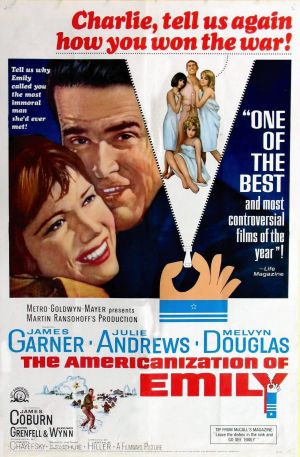
THE AMERICANISATION OF EMILY
US, 1964, 113 minutes, Black and white.
James Garner, Julie Andrews, Melvyn Douglas, James Coburn, Joyce Grenfell, Liz Fraser.
Directed by Arthur Hiller.
The Americanisation of Emily was made before its time. It fits quite easily into the tradition of Dr Strangelove, How I Won the War, M*A*S*H* and Catch 22, but in 1964 it was taken rather literally and rather seriously and seen as an unworthy and amoral attack on the virtues of patriotism. We would be more at home with it now.
The American jingoistic-patriotic spirit is satirised in the context of the D- Day invasion of Normandy. The navy is so concerned with its own advancement that they coin the slogan, "The first dead man on Omaha beach was a sailor." In an ironic way, the Admiral's personal assistant fulfils the role and the Americans are faced with a dilemma that involves expediency and principles. Expedience wins (as always?) Melvyn Douglas contributes an excellent performance as the psychotic admiral. James Garner and James Coburn are the dubious heroes. This was Julie Andrews' first film and she recites in perhaps a too polished (and lifeless) a fashion for the part she is supposed to play. Director Arthur Hiller is now a rich man. He directed Love Story! For those who like sharp satire or anti-war films.
1. What was the purpose of this film? What was its attitude to war? Would it change the mind of anyone who was opposed to its ideas?
2. What is the role of the "Dog-Robber" in war? a Jeeves, a P.R. man, a pimp, a ruthless manager? Is the "Dog-Robber" typical (or symbolic?) of the man engaged in war?
3. Was Emily a credible character or was she meant to be 'Typical' of something? Why was she so emotionally intense as well as casual? What influence did her permissive mother have? Was she still a prig?
4. What picture of military and navy organisation did the film give? The Admiral was mad, governed in his actions by a paranoia obsession for the navy's success, a drinker, changeable in decisions and more interested in navy P.R. than reality. Was this satire a caricature or did it blend with the mood of the film?
5. How heavy was the satire on the admiral in his pragmatism and principles on prolonging the navy force by war? "The first dead man on Omaha beach was a sailor" - the Navy wins the war and impresses a Senate Select Committee?
6. What was Charlie meant to represent in the film? Was He likeable or merely a pimp, immoral, casual, go-getting? He said he faced the unreality of war. Because it is the virtuous who keep the war going, it is useless to pretend; virtue is useless and hopeless. Cowardice was, therefore, a principle.
7. Why did he play along with the Admiral's wishes but not take them too seriously? How effective was the D- Day landing with its "Carry on Cowardice" scenes? What was the irony in this picture of D- Day and Charlie as the, first to land even though he was forced by gunfire from his friend?
8. When he becomes a celebrity in Time Magazine, Life, etc. he is faced with principle and wants to put it into practice, but the people of principle (including Emily who now loves and advocates lies) insist on pragmatism and deception. What is the effect of all this irony on the audience and the audience's reactions to politics and war?
9. Why did Emily's mother live deliberately in unreality? Did she simply do what all those responsible for the war were doing?
10. How typical Was Charlie's associate officer - amoral, jingoistic, pragmatic and no principle - yet a patriot?
11. What was the effect of some of the farcical nature of the satire? How sharp were the film's comments on war and death?
12. What was the Americanisation of Emily and was it good or not?